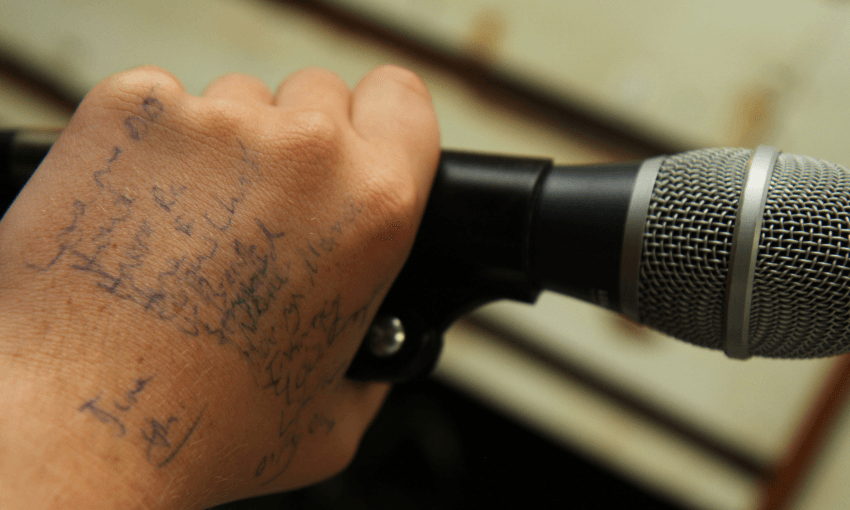Slam poetry! It’s raw, it’s rough, and it’s also a wildly popular live entertainment, writes Ben Fagan, who is masterminding slam events across the country this month.
One of my favourite poetry moments happened a few years ago. I was at a slam in Wellington. It was packed. Someone had just finished performing and there was a lull while scores were tallied. The host Travis was speaking to the audience when, near the front, a young woman’s hand shot up.
“Yes?”
“I’ve got a poem.”
“Is it a short one?”
“Yup.”
Travis invited her to the stage. She announced, “This poem is for John.” And then she delivered the immortal lines:
Roses are red,
violets are blue.
You are a cunt
and I don’t fuck with you.
It was a masterclass of style over substance. Without a backwards look she bounced offstage and into the night. The audience took a collective breath and whispered to each other that they were glad they came. John had performed a love poem earlier in the evening; word went around at the halftime break that it wasn’t about his then-girlfriend, who had been sitting in the audience.
Years before hearing “The Destruction of John”, I attended my first poetry slam by accident. A friend of mine from back in the day was competing and asked if I’d come along to support. I was surprised to be handed a set of Olympic style scorecards on arrival.
Poetry slam is a competitive event, I learned, where random audience judges assign points to performances. There are rounds and eliminations until a Slam Champion remains. The poetry I witnessed was smart and funny and moving. I found the crowd raucously supportive, so much so that in the following months I kept turning up. Wrote my first poem. Then another.
Handing out scorecards introduced a competitive element that interested the plus-ones and pint-drinkers as much as the poets. Since the first Chicago slams in the 1980s there are now national competitions in over 50 countries, with smaller events running in many more.
In America, slam is serious business. Winning the Women of the World Poetry Slam or the Individual World Poetry Slam might lead to a book deal, while Europe invites poets to Paris every year for the equally serious Coupe du Monde de Slam Poésie. As I became a regular slam-attender, I realised that the scoring was a clever trick to draw in normies. Every “I really think she should have won” and “That score was too low” revealed an engagement with the writing. As all good slam hosts say: the point is not the points, the point is the poetry.
I never liked poetry at high school, common story. Like many Kiwi kids we were required to read and dissect aging pieces, even the occasional Baxter photocopy was too far from my 16-year-old experience to relate. Despite a passing interest in writing, I would never have taken myself to a “reading”.
But Aotearoa is well suited to slam. Māori and Pasifika oral tradition is a natural friend to contemporary spoken word (and if I don’t mention Sam Hunt now, someone else will). The first slams happened in NZ around the new millennium. A coordinated effort in 2011 gathered competitors from across the country to find a New Zealand Slam Champion. Every year since, there have been national events.
This year there are regional finals in Auckland, Hamilton, Hawke’s Bay, Wellington, Nelson, Christchurch, Dunedin and Queenstown, mostly over the next month. Slam in New Zealand is a widespread but still fragile pastime. Whole communities rise and fall on the enthusiasm or energy of a few. Sometimes it only takes one person moving out of town for a scene to disappear.
The winners of our national competition are a diverse bunch, with vastly different stories and voices. While there is influence here of the American spoken word style, Kiwi audiences often pull towards the more quirky or interesting; those obviously sharing their own experience. I hear Queenstown’s 2018 rep is a bush balladeer.
There is a trend of viral poetry videos filmed on phones, at slams and in classrooms. These share a voyeuristic quality, a sense you’re getting a glimpse into a private moment. Like how sharing a secret brings people closer together, good writing lets us see ourselves in someone else’s story.
That young woman’s angrily improvised poem for John had clear intent, but was a bit light on imagery. If the judges had a chance to score her, I imagine that would have been reflected in the points. She did bring us together though. We were united in the message of not fucking with John. Which is a good start.
Slam events are being held in Hastings on October 19, Auckland on October 24, and Wellington on October 27; for details, and events elsewhere, visit http://www.newzealandpoetryslam.com/



